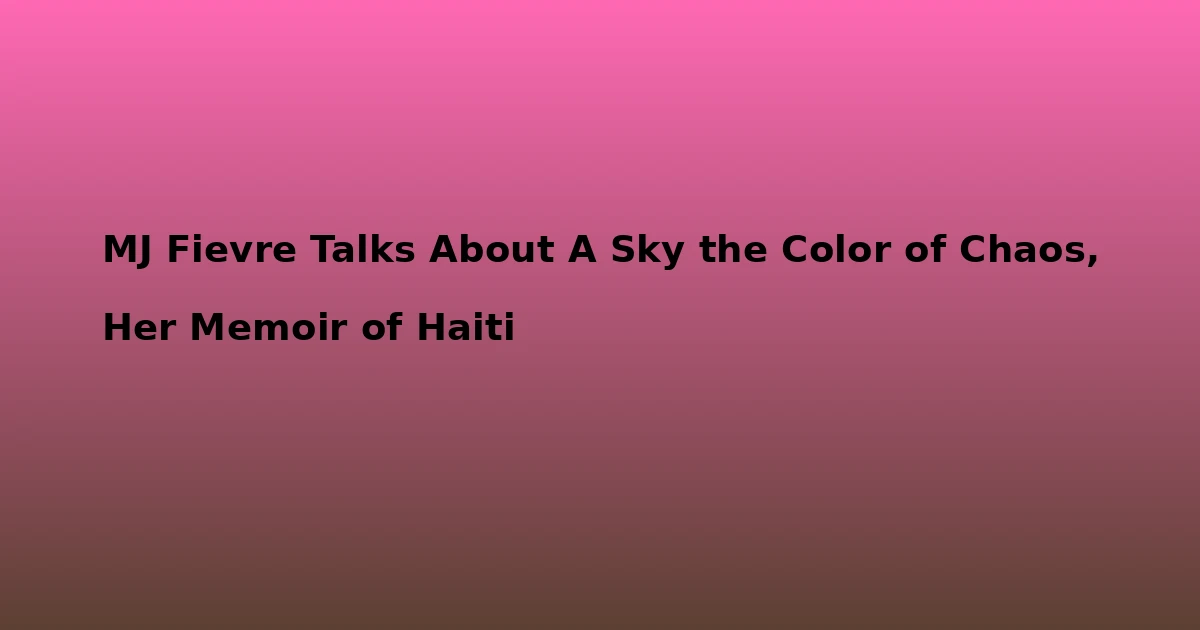Elsie Augustave is a brand new voice in Haitian literature worth listening to.
Her debut novel The Roving Tree brings Haiti and the United States together through Iris Odys, a five-year-old girl whom we first meet in a small village in Haiti called Monn Nèg.
Iris’s mother Hagathe wants her to have a life better than those of the other women in the family before her, and hand her over to the Winstons, an American couple—one-half of whom is an anthropologist doing fieldwork in Haiti.
Iris thus comes to be part of the wave of Haitian children adopted by American couples. And it’s the 1960s, during a time where the country is controlled by a man, who in the words of the narrator, is one “who decides when the rain should fall and when the sun should shine in Haiti.”
And men, young and old, from Hagathe’s hometown make vows like: “I believe in Papa Doc, the almighty father, creator of the nation, who can protect us.
I swear to kill without hesitation, even if it is my father or my mother who brought me into this world, to safeguard the power of Papa Doc, the only one able to lead the country.”
Hagathe sends Iris off with the Winstons without as much as a hint of how she was brought into the world—just a picture of herself. Gradually, Iris Odys grows away from her roots. She’s the woman who calls a foreigner her mother, and refers to her birth mother by her first name.
The Winstons are by all means well-meaning; they even allow Iris to keep her last name Odys, as a reminder of her Haitian roots. They set up appointments with a local psychologist to help their adopted daughter in her new life as a black immigrant adopted by a white American family in a racially segregated nation.
Decades later, it is up to Iris—who has grown through a semi-militant, Afro-centric phase, to dig up her roots, roots that are deeper than she realized. The road to knowing herself culturally isn’t paved with copper and gold.
During a visit to Haiti, she muses: “Although I took pleasure in bathing in the river, eating local food and being reacquainted with Haitian life, I felt more like a tourist who willingly blended into a new culture, knowing the experience was only temporary.
Sooner or later, my life would resume its course away from the pastoral setting. It would have been different if I had never left. But now, another culture and another life had laid claim to me.”
Iris returns at a time when Haiti’s color divide is still going full blast, but the decline of blue blood privilege is also being mourned.
At a dinner table with the Bonsangs, the elite family in whose home her mother Hagathe once worked as a maid the conversation goes like this: “Nowadays if you look around our institutions, the people in charge have names like Barilus, Célius, or even Alcius.”
“Names with those endings usually mean a person is rooted in Haitian peasantry,” explains another character.
“Even the fish have deserted Haiti,” says Pierre, one of the characters in the novel, more than hinting at the degradation of the environment, and Haiti’s marine population.
It’s while in Haiti that Iris puts together the missing pieces of her life, and the long-buried secret of her origins.
Iris Odys’ journey indeed takes her to Haiti where she was born, but also to Africa where her ancestors come from, and as a roving tree, her roots fall where they can grow again and again. She has much in common with her creator Elsie Augustave from the Haitian birth to the trek to Zaire.
Augustave, who and holds degrees from Howard University and Middlebury College, discussed the genesis of her novel, her characters, and her creative world.
Tell us about yourself.
My father migrated to the United States, followed by my mother a couple of years after, leaving myself and my siblings to be cared for by family. Once they settled and adjusted, they sent for us.
That was a classic scenario for Haitians during that period of mass exodus from Haiti under the Duvalier regime. Spring Valley, in upstate New York, is the first place I lived in the United States. At the time besides my family, there were only two other Haitian families living there. As a French and Spanish major at Middlebury College in Vermont, I discovered the aesthetics of literary analysis and decided to make the study of languages, literature, and culture a lifetime endeavor.
During my sophomore year, I studied in Bogotà Colombia for a semester and spent my junior year in Madrid. Subsequently, I attended Howard University, specializing in Franco-African and Caribbean Literature in the Romance Languages Department.
There’s this notion that every time an author writes a novel, there’s an element of herself in it. Is The Roving Tree autobiographical?
People do indeed believe that. But no, The Roving Tree is not autobiographical.
The only thing I have in common with Iris is that I have also been to the countries where she has traveled. But then again I guess I could consider her an “element” of myself in the sense that I am an “element” of my parents. However, we have our own lives and are vastly different.
A Fulbright scholarship allowed you to go study in Senegal and France. How do you think those experiences shaped your writing?
Those experiences have contributed largely to the creative process of the novel because I was able to draw from my cultural knowledge of those countries to tell Iris’ story.
Travel has also provided a broader dimension to my writing in terms of a cross-cultural outlook.
The Roving Tree is your debut novel. Was it your first try at writing a book?
The Roving Tree is indeed my very first attempt at writing fiction. In the past, I have kept journals but have never been consistent at the task.
I have also written a few bad poems, just as an outlet to express my feelings. Other than that, my writing was previously limited to academic papers.
How long did it take you to write the novel?
That’s a hard question to answer. I started the novel twenty years ago. However, as a working single mother, with absolutely no support, I was always busy taking my son to activities and running the house. So there was hardly any time to write.
As a teacher I had to wait for the summer vacation to write and even then I had to send my son to camp to be able to immerse myself in writing the novel. Sometimes I would get discouraged, put the manuscript in a drawer, and not look at it for years.
And then after a while the story would haunt me and I would pick it up again.
Is being an author everything you thought it would be?
I didn’t have any preconceived ideas about being an author. I wrote because I felt the need and the obligation to write. I also think it’s too early for me to tell what it is really like to be an author. It just hasn’t hit me yet.
One of the most significant moments in the life of Iris, your adopted protagonist is that scene where her sister Cynthia has to fight with a schoolmate, over Iris being called the n-word, a word she does not yet understand.
Iris arrived in the United States at the height of the Civil Rights Movement. So I tried to imagine the life of a young black girl in an all-white school in an affluent suburb.
I wanted to point out that not all whites were free of racial prejudices or as welcoming as the Winstons; I wanted Cynthia to fight Iris’ battle to prove the total support Iris has in the Winstons’ household.
I also wanted to emphasize that even though Iris has adapted to life in the U.S, she still has a lot to learn about American society, and of course if Iris is going to learn about the n-word, it has to be outside of her adopted family home.
That fight is indeed a pivotal moment in Iris’ life and is the source of her conflicts.
Were you an avid reader as a little girl?
This question makes me smile as it reminds me of the first book I ever read for entertainment. It was Comtesse de Ségur’s Mémoires d’un âne-–Memories of a donkey. I must have been about seven. That book opened my imagination, and I discovered something magical about books, where all things are possible.
My teacher, Madame Baron, discovered my passion for reading and began to lend me books. I was always tired in school because long after everyone has gone to bed, I would turn on the light to read until very late in the night. My sister, with whom I shared a room slept through it all.
But she likes to tell people that when my parents sent us money from New York, she would use hers to buy apples, grapes, ham, etc., stuff that were considered a delicacy in Haiti then. But me, I would head straight to a bookstore.
Who did you admire growing up, literature-speaking?
I loved reading books that kids my age read in Haiti, books by Comtesse de Ségur and Enid Blyton. Then I starting reading whatever I could get my hands on. My grandfather and my aunt liked to read and had books and magazines subscriptions.
When I lived with them after my mother left, I used to take their books as soon as the mailman delivered them, stay up late to read, and pretend that they have just arrived after I finished reading them. One of the reasons I was happy when we moved out of Spring Valley to New York City was so that I could visit the French bookstore in Rockefeller Plaza to purchase French books as I still enjoyed reading in that language.
I later discovered Graham Green at my high school library and exhausted their entire collection.
You were born in Haiti. At which point did you leave?
I left Haiti in 1967 after completing my elementary schooling.
What do you remember about your time there?
I remember many things, especially my summer vacations in Las Cahobas and Cabaret where my parents originated. There were always a lot of people around in either place.
Imagine, my father had eight siblings and my mother eleven, and it was the custom on both sides of the family for everyone to send their children to their parents’ home in the summer.
Now that was a whole lot of cousins in one place! I also recall that we used to go to the river to bathe. What I remember most were the folktales that people told at night and that captivated me.
When was the last time you got on a plane and visited?
I was there two years ago with my son and my sister for a quick three-day visit to my parents, who have retired in Cabaret.
As a new author, what changes do you anticipate in the world of books in the next few years?
I foresee that within the next decade, at the most, books will become an idea embedded in the past for younger generations. Only those of us who grew up with books will remain mentally attached to them. In fact, even textbooks are slowly disappearing in the world of education, everything is becoming digital. I think that’s too bad because I love to look at and hold a book.
Seems like novelists even plan story plots in their sleep. Do you have the chapters of your second novel pretty much written already?
I wish. But I’m about half-way there. I still have a lot of research to do before I can finish.
You can get the book .
Last Updated on December 2, 2025 by kreyolicious



